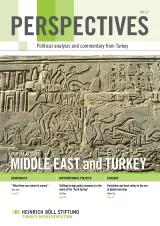Perspectives Turkey 2/2012: Middle East and Turkey
Archived | Content is no longer being updated
The first issue of “Perspectives” got mostly very positive responses and reactions. Especially readers outside of Turkey but also from within were very enthusiastic about the attempt to provide profound analysis on developments of Turkey. Many readers agreed with us on the need of such information. Critical voices were also raised; the Turkey Representation of the Heinrich Böll Stiftung should deal with the “deep state” in Germany instead of the “deep state” in Turkey. Immediately after launching the first issue, we could observe an increase in the number of articles especially on the internet that defame our association or myself as accusing to be part of the German deep state or enemy of Turkey. We consider such articles as a somehow “Pavlovian response” to any critic – be it from within or without of Turkey. We would appreciate a criticism about the articles and views expressed in the Perspectives but, we accept criticism only based on arguments, facts and analysis and strongly dismiss any defamation, against our organization or the authors. The more, a vivid debate and different views is a prerequisite of democracy. Any attempt to criminalize or threaten authors or organizations with critical views are considered anti-democratic, the same is valid for methods of censorship.
When preparing our second issue of Perspectives, with a special attention on “Turkey and the Middle East”, we were well aware that the situation is changing with an incredible speed. From the very beginning, the HBSD was critical about the “zero problems” concept which was propagated by Foreign Minister Ahmet Davutoglu. Already at that time, we as HBSD criticized, that you cannot and should not attempt to be “everybody’s darling”. You should develop criteria which guide your foreign policy, criteria based on democratic standards or international law. The government of Turkey was repeatedly announcing that Turkey hence is acting according its own interests – hereby suggesting it did not so before. In whose interest did Turkey then act? We also questioned if there was really a qualitative new foreign policy approach or if the “zero problems” policy was nothing more than a good PR strategy of the AKP government.
From the retrospective, we think, our critics of the last years proved to be true. The AKP government had to realize that its so-called zero problems policy did not lead to create any further influence on the neighboring regimes. Secondly, as the articles in this issue clearly show, the AKP did also not have a strategy toward the – indeed – difficult situation in Syria. We can observe a shift in its policy and a lack of a consistent strategy. The more, we should describe Turkey’s foreign policy as slippery and draw attention to the regular attempts which are trying to readjust its policy and to align it with its interests that are of course, influenced by the developments.
In this issue, we will not only analyze the shift in foreign policy and the impact of the “Arab spring” but also shed some light on the very recent developments in Syria from within. Finally, we will draw your attention on the impact of the crisis – especially in Syria – on the eastern part of Turkey, Antakya and the Kurdish regions. This is also to understand the close interrelation of Turkey’s foreign policy and internal politics. Internal problems of Turkey related to democracy, freedom of religion, etc. are reflected in its foreign policy. The reaction of Turkey concerning the establishment of an autonomous Kurdish entity in Syria is symptomatic. Turkey fears a spillover effect. Without having any serious policy for the Kurdish issue inside Turkey, the government seems to show panic reactions due to the development in Syria.
As a matter of fact, the third issue of Perspectives will deal with the “Kurdish problem” or should we name it the “problem of Turkishness” or the “Turkish problem” – as is suggested by many intellectuals?
In the name of the editorial team
Ulrike Dufner
